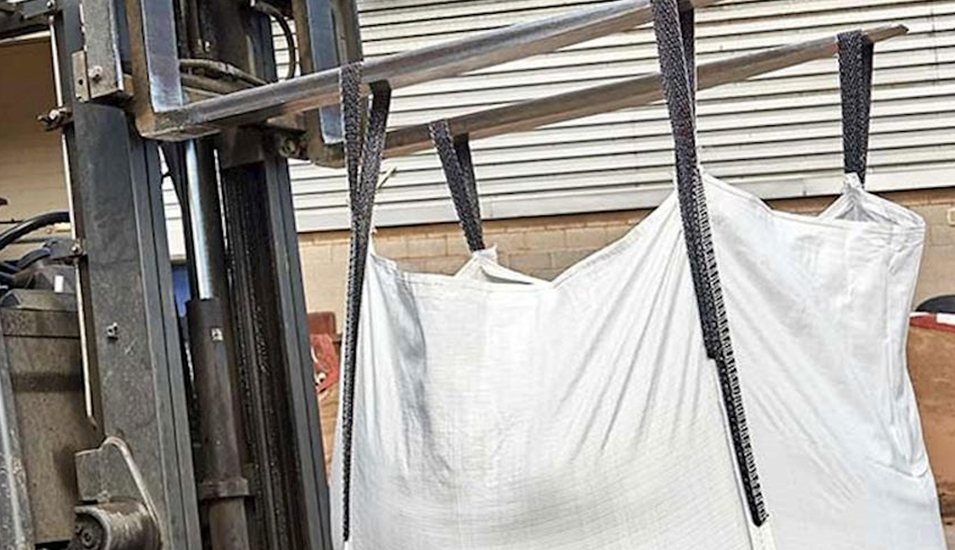
In this article we answer the most frequently asked questions surrounding Flexible Intermediate Bulk Containers/ FIBC Bags.
With the constant development of the construction industry FIBC Bags are being more frequently used on a daily basis.
FIBC Bags are typically used for materials that are too light to have enough weight to be handled by traditional conveyors.
They can carry everything from granules and powdered products to super-lightweight powders.
Manufactures make the bags in all standard sizes that are able to carry materials that won’t damage the FIBC bag.
Bags are available with different types of valves for product discharge, dust extraction, sealing etc.
Depending on where the source of the bags is from they can also be custom made to specific customer request.
Table of contents:
6 Frequently Asked Questions:
Below is a list of the questions we commonly see on a regular basis that you too may also have.
We hope they help you understand FIBC Bags a little better.
Giving you enough insight to have FIBC Bag questions of your own answered too if it’s required.
If you’re looking to purchase FIBC Bags visit the Qube UK shop here.
1) Are Bulk Bags Recyclable?
Simply said, FIBCs are composed of 100% polypropylene and can be recycled.
One exception to the above is that most recyclers only accept large amounts of garbage.
Often FIBCs are not accepted in your normal recycling containers.
The bag may contain materials that cannot be recycled for reuse directly.
However, they can still be ground up and used as filler material to create new FIBC bags.
The scraps can also be melted down and used to create FIBCs under the new FIBC bag specifications.
FIBC bags are sufficiently strong and can be cleaned.
This means they can also be used for other shipping applications after their original use has been fulfilled.
2) How Much Product Can a Bulk Bag Hold?
Jumbo bags are designed to carry loads of up to 4,000 pounds.
They’re made to have a Safe Working Load (SWL) meaning they can sustain between 1,000 to 4,000 pounds load.
A few specialized bags can carry up to 5,000 pounds, but they are rare and difficult to come by.
There are 2 main FIBC Bag specifications to consider for new FIBC Bag purchses
The first specification is Strap Specification, or Strap Tear using the ISO 11992-1 standard.
This specification is the means by which FIBC bags are tested for strap tear resistance.
The second FIBC Bag Specification to consider is FIBC Dust Test.
This allows us to know how much dust can pass through each FIBC bag.
The dust test is conducted using the ISO 14688 standard.
Bags that meet FIBC dust tests are usually suitable for bulk solid materials that produce a lot of dust when in transport or when in storage.
3) Can FIBCs Be Reused?
Bags may be reused under specific conditions.
The bag must be intended and tested for multiple uses.
This reuse certification varies based on specific conditions.
The FIBC bags must be in good physical condition with no visible defects.
Bags must have an SFR of 6:1 in order to be reused.
For more information on FIBC Bags visit Qube UK here (https://qubeuk.com)
4) What Is The Difference Between U-Panel, Circular, & 4-Panel bulk bags?
U-Panel Bags
U-panel bags are created using three body panels.
One of the panels runs the full length of the bag.
The bottom of the pouch is made out of two more pieces of fabric sewn into the larger piece, giving it four sides.
When filled, the U-panel bags will preserve a rectangular form similar to other construction types.
Especially a U-panel bag with baffles.
U-panel bags are an industry standard.
They’re the most common of their kind, with high safe working loads (SWLs) and long-lasting quality.
Circular Bags
Circular bags on the other hand adopt a slightly different design.
They’re comprised of a tubular piece of fabric that wraps around all four sides of the bag for stitching only on the top and bottom.
Although the fabric is tubular, when filled, the circular baffle bag has the shape similar to that of a square bag.
When a circular bag is filled, there’s a widespread misconception about regarding it’s shape.
They’re simply made out of a single piece of fabric that encloses all four sides of the bag.
The fabric of a 4-panel bag is made from four separate pieces that are stitched together to form a square structure.
4-Panel Bags
A 4-panel bag will maintain its square form when filled, similar to that of other construction materials.
4-panel bags tend to keep their form better than U-panel bags, and U-panel bags hold their form better than circular bags.
The main disadvantage of 4-panel bags is their higher volume of stitching required to keep the bag together.
This might allow for a larger number of bag components that are susceptible to failure.
4-panel bags, on the other hand, are great for storage since they retain their form when packed.
Each design comes with both its advantages and disadvantages.
Depending on the job it’s essential to select the most suitable design for you.
5) What is the Coating or Laminate on a Bulk Bag?
The laminate is a second polypropylene film that serves as a coating.
The film is applied to the bag’s fabric, filling in the tiny gaps in the poly weaves.
This film may be applied on both the inside and outside of the bag.
A sealant or laminate applied to the walls also functions as a moisture barrier.
For some applications, a poly liner is a superior option for protecting the contents.
The bag will not be completely waterproof regardless of whether it is coated or has a liner.
6) What Does 5:1 and 6:1 SF Mean?
All woven polypropylene bags are intended to be used only once.
When single use bags are rated against the Safety Factor Ratio (SFR), they score a 5:1.
This means that they can carry five times their rated safe working load (SWL).
We advise against filling a bag above its safe operating load for safety reasons.
For multiple uses, some woven polypropylene FIBCs are produced specifically.
Multiple usage/multiple trip bags are designed to carry up to six times their safe working load and can sustain 6:1 safety factor ratio.
As previously stated, we do not recommend filling a bag to its safe operating load due to safety reasons.
To Summarise: FIBC Bags: 6 Frequently Asked Questions
Having now come to the end of this article we hope we answered any questions you sought after before reading.
We have covered a range of topics and talking points hopefully widening your knowledge.
Thank you for reading FIBC Bags: 6 Frequently Asked Questions.
Got More Questions?
If you’re interested in learning more, read some of our other articles:

